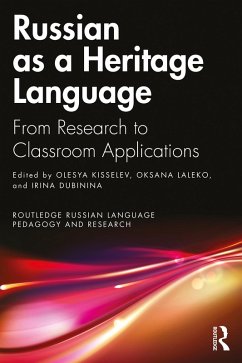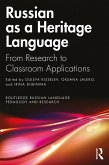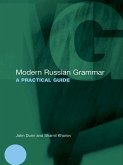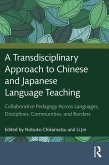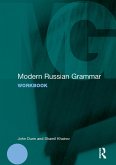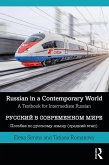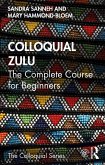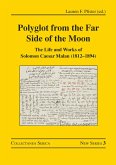Russian as a Heritage Language (eBook, ePUB)
From Research to Classroom Applications
Redaktion: Kisselev, Olesya; Dubinina, Irina; Laleko, Oksana
49,95 €
49,95 €
inkl. MwSt.
Sofort per Download lieferbar

25 °P sammeln
49,95 €
Als Download kaufen

49,95 €
inkl. MwSt.
Sofort per Download lieferbar

25 °P sammeln
Jetzt verschenken
Alle Infos zum eBook verschenken
49,95 €
inkl. MwSt.
Sofort per Download lieferbar
Alle Infos zum eBook verschenken

25 °P sammeln
Russian as a Heritage Language (eBook, ePUB)
From Research to Classroom Applications
Redaktion: Kisselev, Olesya; Dubinina, Irina; Laleko, Oksana
- Format: ePub
- Merkliste
- Auf die Merkliste
- Bewerten Bewerten
- Teilen
- Produkt teilen
- Produkterinnerung
- Produkterinnerung

Bitte loggen Sie sich zunächst in Ihr Kundenkonto ein oder registrieren Sie sich bei
bücher.de, um das eBook-Abo tolino select nutzen zu können.
Hier können Sie sich einloggen
Hier können Sie sich einloggen
Sie sind bereits eingeloggt. Klicken Sie auf 2. tolino select Abo, um fortzufahren.

Bitte loggen Sie sich zunächst in Ihr Kundenkonto ein oder registrieren Sie sich bei bücher.de, um das eBook-Abo tolino select nutzen zu können.
Russian as a Heritage Language: From Research to Classroom Applications brings together linguistically and pedagogically oriented research traditions in a comprehensive review of current Russian heritage language (HL) studies.
- Geräte: eReader
- mit Kopierschutz
- eBook Hilfe
Andere Kunden interessierten sich auch für
![Russian as a Heritage Language (eBook, PDF) Russian as a Heritage Language (eBook, PDF)]() Russian as a Heritage Language (eBook, PDF)49,95 €
Russian as a Heritage Language (eBook, PDF)49,95 €![Modern Russian Grammar (eBook, ePUB) Modern Russian Grammar (eBook, ePUB)]() John DunnModern Russian Grammar (eBook, ePUB)47,95 €
John DunnModern Russian Grammar (eBook, ePUB)47,95 €![A Transdisciplinary Approach to Chinese and Japanese Language Teaching (eBook, ePUB) A Transdisciplinary Approach to Chinese and Japanese Language Teaching (eBook, ePUB)]() A Transdisciplinary Approach to Chinese and Japanese Language Teaching (eBook, ePUB)36,95 €
A Transdisciplinary Approach to Chinese and Japanese Language Teaching (eBook, ePUB)36,95 €![Modern Russian Grammar Workbook (eBook, ePUB) Modern Russian Grammar Workbook (eBook, ePUB)]() John DunnModern Russian Grammar Workbook (eBook, ePUB)40,95 €
John DunnModern Russian Grammar Workbook (eBook, ePUB)40,95 €![Russian in a Contemporary World (eBook, ePUB) Russian in a Contemporary World (eBook, ePUB)]() Elena SimmsRussian in a Contemporary World (eBook, ePUB)40,95 €
Elena SimmsRussian in a Contemporary World (eBook, ePUB)40,95 €![Colloquial Zulu (eBook, ePUB) Colloquial Zulu (eBook, ePUB)]() Sandra SannehColloquial Zulu (eBook, ePUB)48,95 €
Sandra SannehColloquial Zulu (eBook, ePUB)48,95 €![Polyglot from the Far Side of the Moon (eBook, ePUB) Polyglot from the Far Side of the Moon (eBook, ePUB)]() Polyglot from the Far Side of the Moon (eBook, ePUB)41,95 €
Polyglot from the Far Side of the Moon (eBook, ePUB)41,95 €-
-
-
Russian as a Heritage Language: From Research to Classroom Applications brings together linguistically and pedagogically oriented research traditions in a comprehensive review of current Russian heritage language (HL) studies.
Dieser Download kann aus rechtlichen Gründen nur mit Rechnungsadresse in A, B, BG, CY, CZ, D, DK, EW, E, FIN, F, GR, HR, H, IRL, I, LT, L, LR, M, NL, PL, P, R, S, SLO, SK ausgeliefert werden.
Produktdetails
- Produktdetails
- Verlag: Taylor & Francis eBooks
- Seitenzahl: 304
- Erscheinungstermin: 16. April 2024
- Englisch
- ISBN-13: 9781040003848
- Artikelnr.: 70048062
- Verlag: Taylor & Francis eBooks
- Seitenzahl: 304
- Erscheinungstermin: 16. April 2024
- Englisch
- ISBN-13: 9781040003848
- Artikelnr.: 70048062
- Herstellerkennzeichnung Die Herstellerinformationen sind derzeit nicht verfügbar.
Olesya Kisselev is Assistant Professor in the Department of Languages, Literatures and Cultures at the University of South Carolina, USA. Kisselev's research expertise lies in the areas of heritage and second language acquisition, language pedagogy and learner corpus research. Her scholarly contributions include research papers and book chapters on linguistic aspects of learner language varieties as well as on language pedagogy. Oksana Laleko is Associate Professor and Director of Linguistics at the State University of New York at New Paltz, USA, and a book reviews editor of the Heritage Language Journal. She is the author of numerous articles and book chapters on formal linguistic, cognitive, and sociolinguistic dimensions of heritage language bilingualism. Irina Dubinina is Professor of Russian and Director of the Russian Language Program in the Department of German, Russian, and Asian Languages and Literature at Brandeis University, USA. Her research focuses on pragmatics of heritage Russian and heritage language pedagogy, which are the topics of her recent publications. Dubinina is an experienced instructor of Russian as a second and a heritage language.
1 Russian as a heritage language in the 21st century: Bridging research in linguistics and pedagogy
Part 1
Understanding heritage Russian speakers' linguistic and pragmatic competence
2 Linguistic knowledge and proficiency assessment in heritage and L2 Russian: Classroom implications of experimental findings
3 Phonetic production of Russian heritage speakers in Finland: Implications for college instruction
4 Forms of address in heritage Russian in Germany: Something to address in the classroom
5 Pragmatics of requests in heritage Russian: Implications for the classroom
Part 2
Literacy development in heritage Russian learners
6 Writing proficiency development in learners of Russian as a heritage language in the Netherlands: A longitudinal study
7 Register variation in the writing of Russian heritage speakers in Israel
8 What eye movements can tell us about reading in Russian as a heritage language: From the lab to the classroom
Part 3
Russian in diaspora: Community schools and communities as 'schools'
9 Can translanguaging be a resource for teaching and learning Russian as a heritage language? Evidence from Cyprus, Estonia, and Sweden
10 Past the second generation: Social, familial, and individual factors in maintaining Russian as a heritage language in Israel
11 Russian as a heritage language in Spain: Educational opportunities for language maintenance
12 The acquisition of Russian by multilingual children in Canada: Heritage language proficiency, language attitudes, and linguacultural exposure
Afterword: Russian without borders
Part 1
Understanding heritage Russian speakers' linguistic and pragmatic competence
2 Linguistic knowledge and proficiency assessment in heritage and L2 Russian: Classroom implications of experimental findings
3 Phonetic production of Russian heritage speakers in Finland: Implications for college instruction
4 Forms of address in heritage Russian in Germany: Something to address in the classroom
5 Pragmatics of requests in heritage Russian: Implications for the classroom
Part 2
Literacy development in heritage Russian learners
6 Writing proficiency development in learners of Russian as a heritage language in the Netherlands: A longitudinal study
7 Register variation in the writing of Russian heritage speakers in Israel
8 What eye movements can tell us about reading in Russian as a heritage language: From the lab to the classroom
Part 3
Russian in diaspora: Community schools and communities as 'schools'
9 Can translanguaging be a resource for teaching and learning Russian as a heritage language? Evidence from Cyprus, Estonia, and Sweden
10 Past the second generation: Social, familial, and individual factors in maintaining Russian as a heritage language in Israel
11 Russian as a heritage language in Spain: Educational opportunities for language maintenance
12 The acquisition of Russian by multilingual children in Canada: Heritage language proficiency, language attitudes, and linguacultural exposure
Afterword: Russian without borders
1 Russian as a heritage language in the 21st century: Bridging research in linguistics and pedagogy
Part 1
Understanding heritage Russian speakers' linguistic and pragmatic competence
2 Linguistic knowledge and proficiency assessment in heritage and L2 Russian: Classroom implications of experimental findings
3 Phonetic production of Russian heritage speakers in Finland: Implications for college instruction
4 Forms of address in heritage Russian in Germany: Something to address in the classroom
5 Pragmatics of requests in heritage Russian: Implications for the classroom
Part 2
Literacy development in heritage Russian learners
6 Writing proficiency development in learners of Russian as a heritage language in the Netherlands: A longitudinal study
7 Register variation in the writing of Russian heritage speakers in Israel
8 What eye movements can tell us about reading in Russian as a heritage language: From the lab to the classroom
Part 3
Russian in diaspora: Community schools and communities as 'schools'
9 Can translanguaging be a resource for teaching and learning Russian as a heritage language? Evidence from Cyprus, Estonia, and Sweden
10 Past the second generation: Social, familial, and individual factors in maintaining Russian as a heritage language in Israel
11 Russian as a heritage language in Spain: Educational opportunities for language maintenance
12 The acquisition of Russian by multilingual children in Canada: Heritage language proficiency, language attitudes, and linguacultural exposure
Afterword: Russian without borders
Part 1
Understanding heritage Russian speakers' linguistic and pragmatic competence
2 Linguistic knowledge and proficiency assessment in heritage and L2 Russian: Classroom implications of experimental findings
3 Phonetic production of Russian heritage speakers in Finland: Implications for college instruction
4 Forms of address in heritage Russian in Germany: Something to address in the classroom
5 Pragmatics of requests in heritage Russian: Implications for the classroom
Part 2
Literacy development in heritage Russian learners
6 Writing proficiency development in learners of Russian as a heritage language in the Netherlands: A longitudinal study
7 Register variation in the writing of Russian heritage speakers in Israel
8 What eye movements can tell us about reading in Russian as a heritage language: From the lab to the classroom
Part 3
Russian in diaspora: Community schools and communities as 'schools'
9 Can translanguaging be a resource for teaching and learning Russian as a heritage language? Evidence from Cyprus, Estonia, and Sweden
10 Past the second generation: Social, familial, and individual factors in maintaining Russian as a heritage language in Israel
11 Russian as a heritage language in Spain: Educational opportunities for language maintenance
12 The acquisition of Russian by multilingual children in Canada: Heritage language proficiency, language attitudes, and linguacultural exposure
Afterword: Russian without borders
